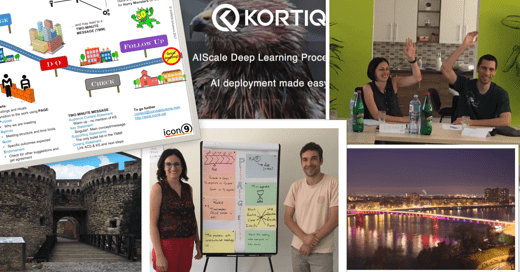KORTIQ knows that its Product Development Team – now busy creating advanced Convolutional Neural Network (CNN) solutions – is critical to winning customers and building long-term commercial relationships. It’s strong technical culture is an asset that it can be proud of and must exploit.
Exposing this culture and the people who embody it is key to a business stratagem known as Customer Intimacy. To enable it, we launched a training program – Excellence in Customer Communication – at KORTIQ’s Novi Sad offices early last month.
After the event, KORTIQ‘s CEO, Harald Weiss, stated, “I am extremely pleased and, to be honest, a little relieved. Some of the team were sceptical about taking non-technical training, but I think they see now that communication is not only important, it’s also a bit technical! And working on it together makes us more robust. It helps everybody to contribute to our future success, which can only come through success with customers.”
The term “Customer Intimacy” was suggested by Treacy and Wiersema in a 1993 paper, Customer Intimacy and Other Value Disciplines : “Companies that excel in customer intimacy combine detailed customer knowledge with operational flexibility so they can respond quickly to almost any need, from customizing a product to fulfilling special requests.” With this discipline, customer-focused behaviour occurs at every level of the organisation.
This does not mean that everyone in the organisation has to become a salesperson, nor even that everyone has to have direct customer contact, but it does mean that all personnel, from the CEO to summer intern students, should carry with them an image of the company’s customers, what they need and what they expect. This not only puts the whole team in a position to better communicate externally when the occasion arises, it also reinforces a sense of shared purpose.
By commissioning training to enable Customer Intimacy, KORTIQ management is modelling the behaviour that it wishes to encourage in its technical team – preparedness, proactivity and openness.
To improve communication skills we have to concentrate on aspects that are rarely addressed, and good preparation for customer encounters is one of them. Hence, all the tools and methods that I deliver – for meeting preparation and initiation, learning and guiding discovery, technical negotiation and others – enhance one’s ability to anticipate customer-facing challenges and be better prepared for them. And they do so with negligible impact on core technical work.
A second aspect relates to openness, by which I mean a positive attitude towards revealing and discussing issues, combined with the ability to do so. A key skill is metacommunication – discussed in a recent article – and this is practiced throughout the training program. Participants emerge with a greatly improved ability to stand back and observe customer interactions, therefore reporting more accurately, learning more from them and taking appropriate action.
Working with KORTIQ on this program is tremendous fun. It hardly seems fair that I get paid for it and learn so much at the same time :-). Of course, I strive for Customer Intimacy also, and so every program is as different as the companies that I work with. Which is great!
To learn more about KORTIQ and my company, ICONDA, please just visit our respective websites.

